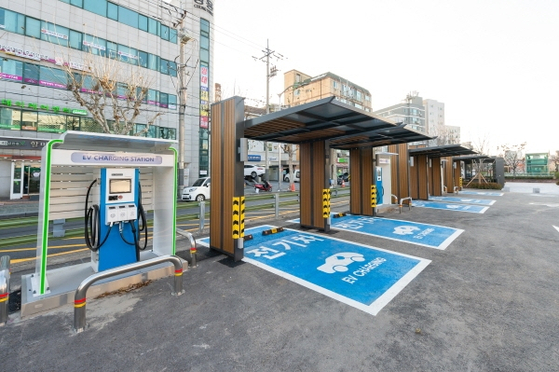
An electric vehicle fast charging station installed by the city of Seoul Provided by Seoul
The government decided to reorganize the subsidy system to supply 300,000 non-polluting vehicles (electric and hydrogen vehicles) this year, and to significantly expand infrastructure such as charging stations.
The Ministry of Environment announced on the 18th that it had proposed and discussed the ‘2021 Pollution-Free Vehicle Dissemination Innovation Plan’ at the 122nd National Pending Adjustment Inspection Meeting, presided over by Prime Minister Jeong Se-gyun. This plan aims to accumulate 300,000 pollution-free vehicles within this year to accelerate the popularization of pollution-free vehicles and carbon neutrality in the transportation sector. To this end, we plan to select and actively promote four areas, including ① preparation for transition to achieve carbon neutrality, ② creation of public and private demand, ③ reorganization of subsidies, and ④ improvement of recharging services.
First of all, support for high-performance and high-efficiency pollution-free vehicles will be expanded to improve the performance and popularization of pollution-free vehicles. When calculating subsidies, the proportion of fuel consumption is increased (50% → 60%), and energy efficiency benefits (up to 500,000 won) are given to vehicles with excellent low-temperature mileage compared to room temperature. In addition, the standard of subsidy support is differentiated for each price segment in order to foster popular popular vehicles. Vehicles less than 60 million won will be provided with the full subsidy, 50% will be provided for those less than 60 to 90 million won, and those over 90 million won will be excluded from the support.
The charging infrastructure is also greatly expanded. The Ministry of Environment said, “We will create a more convenient electric vehicle fast charging environment than gas stations.” With big data analysis, more than 2,800 and 123 super-fast are installed at mobile stations such as highway rest areas and gas stations with high demand for charging. Through this, it was decided to create an environment for rapid charging of electric vehicles at the level of a gas station with more than 12,000 cumulative units.
Hydrogen car charging stations will also concentrate more than 50 units by this year in the metropolitan area, where charging stations are insufficient compared to vehicles. In addition, it was decided to improve the site regulation so that charging stations can be installed in green belts and city parks.
Establishment of the goal of supplying zero pollution vehicles… Contribution is charged if not achieved

The concept image of the exclusive electric cars Ioniq 5, Ioniq 6, and Ioniq 7 that Hyundai will release sequentially. Hyundai Motor Company
The goal of supplying low-emission vehicles will be upgraded so that automobile manufacturers and sellers can supply more electric vehicles and hydrogen vehicles, and a new target for supplying zero-emission vehicles will be established. Low-emission cars will gradually increase the ratio from 18% this year to 20% next year, and pollution-free cars from 10% this year to 12% next year. In addition, in order to increase its effectiveness, it plans to amend the relevant laws and regulations by preparing specific measures, such as imposing contributions to companies that have not achieved the distribution target.
The mandatory purchase of pollution-free vehicles in the public sector is also strengthened. From this year, more than 80% of new vehicles from administrative and public institutions will be purchased and rented as pollution-free vehicles, and the ratio will be increased to 100% from 2023. When private companies convert to pollution-free vehicles, priority is given to purchase subsidies and installation of charging facilities.
Environment Minister Han Jeong-ae said, “The Ministry of Environment will work with related ministries to make 2021 a year to solidify the foundation for the popularization of pollution-free vehicles and the realization of carbon neutrality.”
Reporter Chun Kwon-pil [email protected]
